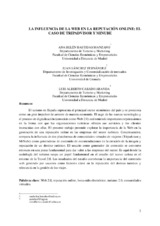Mostrar el registro sencillo del ítem
La influencia de la web en la reputación online: El caso de Tripadvisor y Minube
| dc.contributor.author | Bastidas Manzano, Ana Belén | |
| dc.contributor.author | Sánchez Fernández, Juan | |
| dc.contributor.author | Casado Aranda, Luis Alberto | |
| dc.date.accessioned | 2019-02-11T09:20:03Z | |
| dc.date.available | 2019-02-11T09:20:03Z | |
| dc.date.issued | 2018 | |
| dc.identifier.issn | 2530-7134 | |
| dc.identifier.uri | http://hdl.handle.net/10396/17810 | |
| dc.description.abstract | El turismo en España representa el principal sector económico del país y se posiciona como un gran impulsor de arrastre de nuestra economía. El auge de las nuevas tecnologías y el proceso de digitalización (conocido como Web 2.0) está teniendo importantes repercusiones en la forma con que las organizaciones turísticas ofrecen sus servicios y los clientes interactúan con ellas. El presente trabajo pretende explorar la importancia de la Web en la generación de una reputación online en las empresas del sector turístico. Concretamente, compara la influencia de dos plataformas de comunidades virtuales de viajeros (Tripadvisor y MiNube) como generadoras de contenido de recomendaciones en la creación de la imagen y reputación de un destino turístico. El usuario como generador de contenido se convierte entonces en una pieza fundamental para dar valor a las empresas del sector. Es aquí donde la sociología del turismo ocupa un papel fundamental en el estudio del nuevo turista en el entorno de la Travel 2.0. Los resultados del estudio corroboran la importancia del contenido web generado por usuarios como factores clave en la reputación del destino turístico y relevancia en la gestión de los viajes. | es_ES |
| dc.description.abstract | Tourism constitutes the most influential economic sector in Spain and it is posiTioned as a main driver of the Spanish economy. The recent advance of new technologies and the digitization process (known as Web 2.0) are strongly affecting the way in which touristic firms offer their services and that in which customers interact with them. The current research precisely aims to explore the importance of the Web in generating online reputation between firms belonging to the touristic sector. Specifically, it compares the influence of two platforms of virtual communities of travelers (namely, Tripadvisor and MiNube) as generators of content recommendations in the creation of the image and reputation of a tourist destination. Within such context, the user becomes in a key piece in providing value to tourist firms. At such context, Sociology of Tourism represents a key factor when studying the new tourist within the Web 2.0. The findings of our study corroborate the importance of the web content triggered by users as a key variable influencing the reputation of the tourist destination as well as the relevance in the travel management. | es_ES |
| dc.format.mimetype | application/pdf | es_ES |
| dc.language.iso | spa | es_ES |
| dc.publisher | UCOPress | es_ES |
| dc.rights | https://creativecommons.org/licenses/by-nc/4.0/ | es_ES |
| dc.source | Revista Internacional de Turismo, Empresa y Territorio (RITUREM) 2(2), 3-27 (2018) | es_ES |
| dc.subject | Web 2.0 | es_ES |
| dc.subject | Reputación online | es_ES |
| dc.subject | Boca-oído electrónico | es_ES |
| dc.subject | Turismo 2.0 | es_ES |
| dc.subject | Comunidades virtuales | es_ES |
| dc.subject | Online reputation | es_ES |
| dc.subject | E-WOM | es_ES |
| dc.subject | Tourism 2.0 | es_ES |
| dc.subject | Virtual communities | es_ES |
| dc.title | La influencia de la web en la reputación online: El caso de Tripadvisor y Minube | es_ES |
| dc.title.alternative | The influence of websites on online reputation: The case of Tripadvisor and Minube | es_ES |
| dc.type | info:eu-repo/semantics/article | es_ES |
| dc.relation.publisherversion | http://www.uco.es/ucopress/ojs/index.php/riturem/index | es_ES |
| dc.rights.accessRights | info:eu-repo/semantics/openAccess | es_ES |

